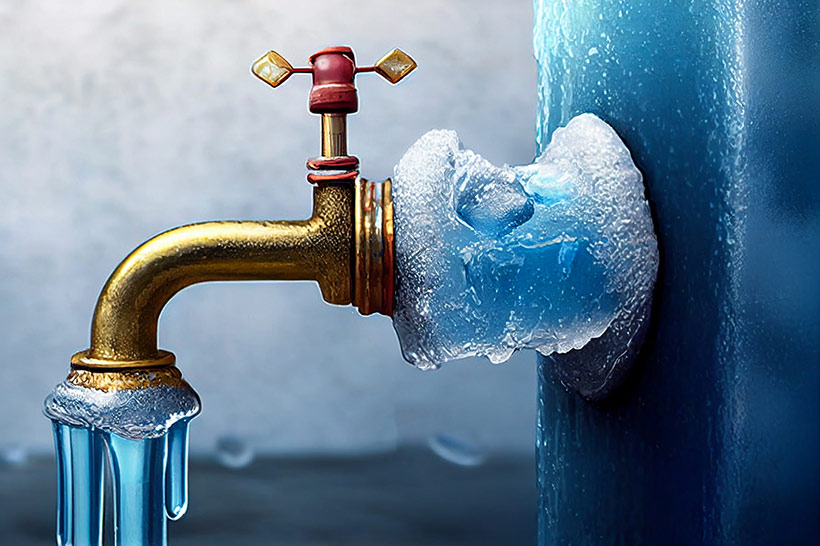Essential Tips to Avoid Frozen Pipes in Cold Weather
Essential Tips to Avoid Frozen Pipes in Cold Weather
Blog Article
Right here in the next paragraphs you will discover a bunch of dependable answers on the subject of How to Prevent Your Pipes From Freezing.

Cold weather can ruin your plumbing, particularly by freezing pipelines. Right here's just how to prevent it from taking place and what to do if it does.
Introduction
As temperature levels drop, the danger of icy pipes boosts, possibly resulting in expensive fixings and water damage. Comprehending how to avoid icy pipelines is important for house owners in cold climates.
Prevention Tips
Insulating prone pipes
Wrap pipes in insulation sleeves or utilize heat tape to protect them from freezing temperatures. Focus on pipelines in unheated or external areas of the home.
Home heating strategies
Keep interior spaces properly heated, specifically locations with plumbing. Open up closet doors to permit warm air to flow around pipes under sinks.
Exactly how to identify frozen pipes
Try to find lowered water flow from taps, uncommon smells or sounds from pipelines, and noticeable frost on subjected pipes.
Long-Term Solutions
Architectural adjustments
Consider rerouting pipelines away from outside wall surfaces or unheated areas. Include extra insulation to attics, cellars, and crawl spaces.
Upgrading insulation
Invest in high-quality insulation for pipelines, attics, and wall surfaces. Appropriate insulation assists preserve regular temperatures and minimizes the threat of frozen pipes.
Shielding Exterior Pipes
Yard hose pipes and outside faucets
Separate and drain pipes garden hose pipes prior to winter. Set up frost-proof faucets or cover exterior taps with protected caps.
Comprehending Frozen Pipelines
What causes pipes to freeze?
Pipelines ice up when revealed to temperatures below 32 ° F (0 ° C) for expanded durations. As water inside the pipelines freezes, it expands, putting pressure on the pipeline wall surfaces and possibly triggering them to burst.
Risks and problems
Frozen pipelines can cause water supply disturbances, home damage, and costly repairs. Ruptured pipes can flooding homes and trigger comprehensive structural damages.
Indicators of Frozen Pipes
Determining icy pipelines early can prevent them from rupturing.
What to Do If Your Pipes Freeze
Immediate activities to take
If you presume icy pipelines, maintain faucets open up to relieve stress as the ice thaws. Make use of a hairdryer or towels taken in hot water to thaw pipes slowly.
Conclusion
Avoiding frozen pipelines requires positive procedures and quick actions. By comprehending the reasons, signs, and preventive measures, home owners can protect their plumbing during winter.
6 Proven Ways to Prevent Frozen Pipes and Protect Your Home
Disconnect and Drain Garden Hoses
Before winter arrives, start by disconnecting your garden hoses and draining any remaining water. Close the shut-off valves that supply outdoor hose bibs and leave the outdoor faucet open to allow any residual water to drain. For extra protection, consider using faucet covers throughout the colder months. It’s also important to drain water from any sprinkler supply lines following the manufacturer’s directions.
Insulate Exposed Pipes
Insulating your pipes is an effective way to prevent freezing. Pipe insulation is readily available at home improvement stores and is relatively inexpensive. Pay close attention to pipes in unheated areas such as the attic, basement, crawl spaces, or garage. Apply foam insulation generously to create a buffer against the cold. You can also wrap your pipes in heat tape or thermostat-controlled heat cables for added warmth.
Seal Air Leaks
Inspect your home for any cracks or openings that could let in cold air. Seal any holes around the piping in interior or exterior walls, as well as the sill plates where your home rests on its foundation. Additionally, make sure to keep your garage door closed unless you’re entering or exiting. Leaving it open creates a significant air leak that can lead to frozen pipes.
Allow Warm Air Circulation
During cold snaps, it’s essential to allow warm air to circulate evenly throughout your home. Leave interior doors ajar to promote better airflow. Open kitchen and bathroom cabinets to help distribute heat consistently around the rooms. If you have small children or pets, be sure to remove any household chemicals or potentially harmful cleaners from open cabinets for safety.
Let Faucets Drip
A small trickle of water can make a big difference in preventing ice formation inside your pipes. When temperatures drop significantly, start a drip of water from all faucets served by exposed pipes. This continuous flow helps prevent the water from freezing. Additionally, running a few faucets slightly can relieve pressure inside the pipes, reducing the chances of a rupture if the water inside does freeze.
https://choateshvac.com/6-proven-ways-to-prevent-frozen-pipes-and-protect-your-home/

As a devoted person who reads about Winter Plumbing Precautions: Preventing Frozen Pipes, I was thinking sharing that portion was sensible. Enjoyed reading our entry? Please share it. Help others check it out. Thanks a lot for taking the time to read it.
Source This Article Report this page